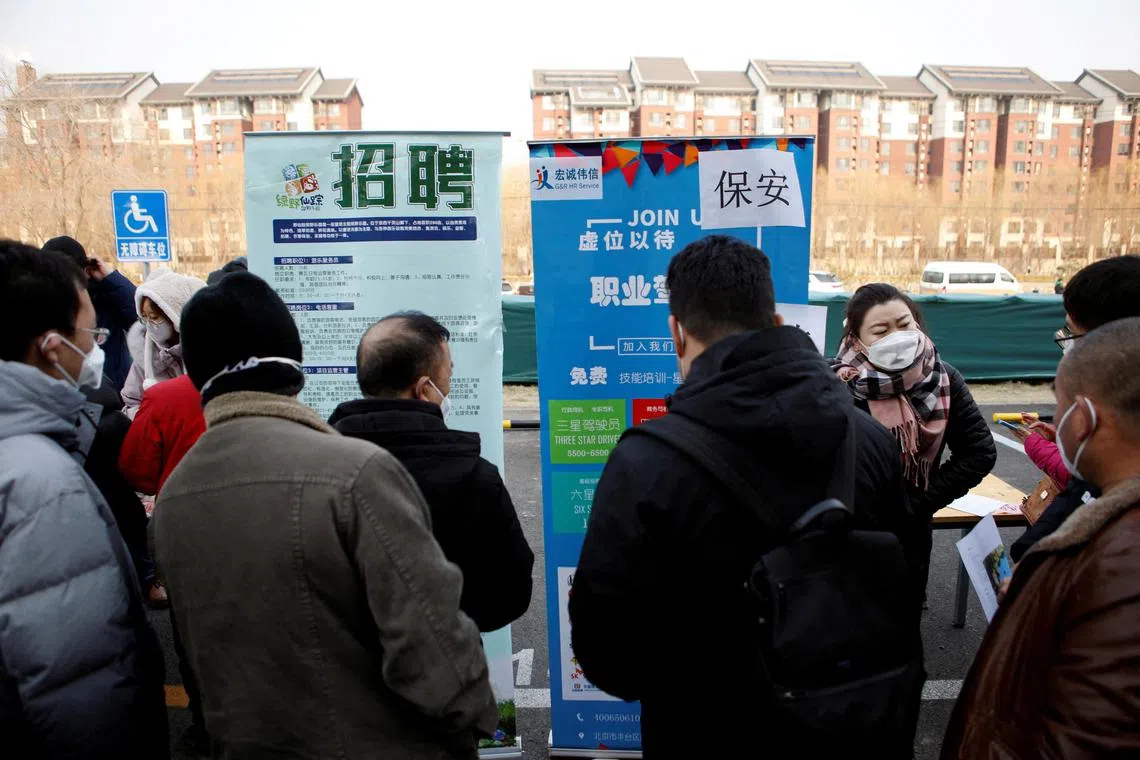Chinese graduates hold off career dreams, take on temporary government jobs
Sign up now: Get ST's newsletters delivered to your inbox

Remote rural positions have seen intense competition from young Chinese with diplomas from top universities.
PHOTO: REUTERS
Follow topic:
BEIJING/HONG KONG - Having failed to find his dream job at a Chinese Internet company upon graduation, Mr Peter Liu settled for a role in a state library where there is so little need for his participation that he spends his time studying for a change in his career path.
“It’s really hard to get work at big companies,” said the 24-year-old, who majored in TV production at a Beijing university before moving back to his home in the central Henan province.
Mr Liu got the librarian job after a government-led campaign to secure temporary work for graduates, which analysts describe as a short-term solution to preserve social stability in a slowing economy with little on offer for youth.
Such “welfare jobs”, as they are known in China, include roles as receptionists, office administrators, security guards and community workers.
Various government institutions offer such jobs every year, but they had usually drawn applications from disadvantaged groups, such as elderly or disabled people.
In 2023, however, amid a deepening youth joblessness crisis
The government sees employment as key to pacifying China’s most pessimistic generation in decades, while graduates able to gain even limited work experience can also benefit their future employers if the economy recovers, analysts say.
The contracts run from one to three years and pay roughly the minimum wage in the region, typically between 2,000 yuan (S$560) and 3,000 yuan a month, sometimes including free meals – much less than the average expectation for a first job salary of 8,033 yuan, according to a survey by Chinese recruitment firm Liepin.
A separate programme aiming for one million internships in 2023 has courted state-owned and private firms for participation.
The Ministry of Human Resources and Social Security, which did not reply to a request for comment on the government programmes or the job market, told state media last week that youth employment was improving.
China has in the past year eased some regulatory burdens on tech, property and finance firms – traditionally large employers of new talent. But state media editorials have also encouraged young graduates to take lower skilled jobs.
On Wednesday, the statistics bureau is expected to omit, for the fourth consecutive month, the release of youth unemployment data. The release was suspended in July after the figure reached a record 21.3 per cent in June, just as 11.6 million fresh graduates were entering the job market.
The total take-up of short-term jobs and internships remains unknown, but social media posts commenting on the selection process and discussing career options are frequent and analysts expect such roles will be in demand in a slowing economy.
Still, the state sector – which provides a fifth of urban jobs in China – can only temporarily alleviate economic pressure for a portion of university graduates through such campaigns, economists say. They also warn that youth unemployment remains a major long-term headache for Beijing.
“Youth unemployment will stay with us for quite a long time, at least for five to 10 years,” said Mr Wang Jun, chief economist at Huatai Asset Management, adding that such temporary jobs are “a short-term fix for stability, to relieve social conflicts brought by joblessness”.
China had witnessed high youth unemployment in the late 1970s and early 1980s as educated youth returned to cities after working the farmlands during Mao Zedong’s rule, as well as in the late 1990s when the country began shrinking inefficient state conglomerates.
A 23-year-old graduate surnamed Chen said she beat more than a dozen applicants in August to a secretary job at a local agriculture centre in the south-western city of Chongqing.
“The gap between my dreams and reality is huge,” said Ms Chen, who wanted to become a teacher.
Meanwhile, Ms Chen and Mr Liu are both using the slow days at work to study for the highly competitive 2024 civil service exam, which drew a record 2.6 million applicants, according to state media.
If they pass the gruelling exam, they would start on one of the most coveted career paths in China, often referred to as the “iron bowl” of financial stability.
Mr Liu never expected to go for a public sector career, but for now he is at least happy that he can take that chance.
“I don’t want my parents to see me staying at home all day with nothing to do,” he said. REUTERS

